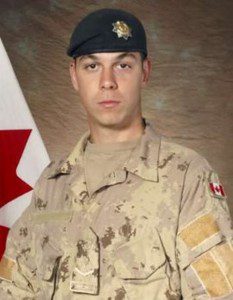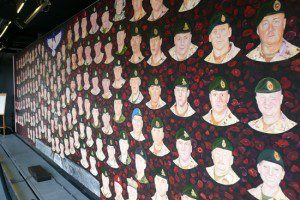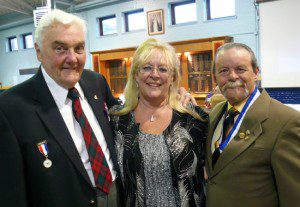
Last Saturday night, during a fundraising event at the McLaughlin Armoury, in Oshawa, Ont., I met the mother of Demetrios Diplaros. Her son, a 24-year-old private in the third battalion of the Royal Canadian Regiment, was killed on Dec. 5, 2008, when the armoured vehicle in which he was travelling hit an improvised explosive device near Kandahar, Afghanistan. Mrs. Diplaros and I spoke for a few minutes during the event, but mostly I just looked sympathetically into her still hurting face. As our conversation wound up, she thanked me for listening.
“I don’t know what I would have done without the support of friends and the military family,” she said, as she held on to me for dear life.
Pte. Diplaros was the 100th Canadian soldier to die in Afghanistan since the Canadian operations – the war on terror – began there in 2002. But the statistics belie the toll on the living left behind. I learned an awful lot about that toll during the fundraiser (sponsored by the Kinsmen) on Saturday night.

The function, which featured a day-long exhibit of a mural entitled “Portraits of Honour,” included a ride-in by more than 2,500 motorcyclists from across North America, a musical tribute to Canada’s fallen, a silent auction and banquet at the armoury, and the unveiling of Dave Sopha’s extraordinary painting. Its 50-foot-by-10-foot mural features the faces of 150 of Canada’s war dead from the Afghanistan operation, including Demetrios Diplaros and the two other Canadians – W/O Robert Wilson and Cpl. Mark McLaren – who died in the same explosion that day.

“That’s when it became too much,” Sopha told me during the fundraiser. “I began painting 16 hours a day, seven days a week. I felt a debt to each military member and to each of their families to make each portrait perfect.”
Since military and civilian groups have learned of my own interest in supporting soldiers’ families – of both the recent past and the distant past – I’ve found myself saying, “Yes” to many, when asked to help out. So, last Saturday evening (two days prior to the 67th anniversary of D-Day) at the fundraising banquet I offered stories – verbal portraits of honour if you like – from June 6, 1944. But as well as telling stories, I listened to some. Not just those of Mrs. Diplaros.
I also listened to Jacqueline DeBruin, on the board of directors of the Toronto Military Family Resource Centre (MFRC), the beneficiary of the “Portraits of Honour” fundraiser. Mrs. DeBruin, it turns out, had not only administered over the MFRC, she had also received its support.
“Both my husband James and I have been posted to Afghanistan (since 2004),” she told me. “And we’ve both received support during the separation when one of us was overseas.”
It turns out that since 2002 the military resource centre has offered such assistance as finding employment, getting packages sent overseas, providing video and telephone conference call lines to spouses each week, administering bereavement assistance and giving the spouse in Canada critical child care. Mrs. DeBruin claimed the MFRC had often been a lifesaver during those times when a tour of duty meant an 8,000-kilometre, year-long separation between her military husband and herself.
“Since this service began, dozens of years ago,” she said, “the military has recognized that deployment can be a real barrier to a spouse’s effectiveness when there’s a long separation.”
DeBruin told me that the 40 staff members at the Toronto MFRC, plus a back-up team of 450 volunteers, can provide assistance to as many as 2,000 military families on a rotating basis right across the Greater Toronto Area. In particular, she remembered when her husband was in Afghanistan. The couple had just been posted from Petawawa, Ont., to Toronto. And she was left with their baby boy. The centre provided what she called “respite care,” which gave her time and access to a public health nurse, a chance to drop off her son to get her shopping done, “and even to go for a manicure, for goodness sake.”
The connection between Kinsmen and wartime assistance, it turns out, goes back to the Second World War, when then Prime Minister Winston Churchill made an emotional plea on radio for milk to feed U.K. children. The Kinsmen’s “Milk for Britain” campaign raised funds in Canada and shipped vast quantities of powdered milk to British children.
Toward the end of the “Portraits of Honour” evening, last Saturday, Todd Doyle, of the Kinsmen Club of Oshawa, announced that the day’s event had accumulated $10,000. Doyle, artist Dave Sopha and all the MFRC volunteers were visibly moved by the gift. Even Mrs. Diplaros. I just wish I could have given her more than a hug of reassurance.
Money and support, as valuable as they are, cannot replace her dead son.